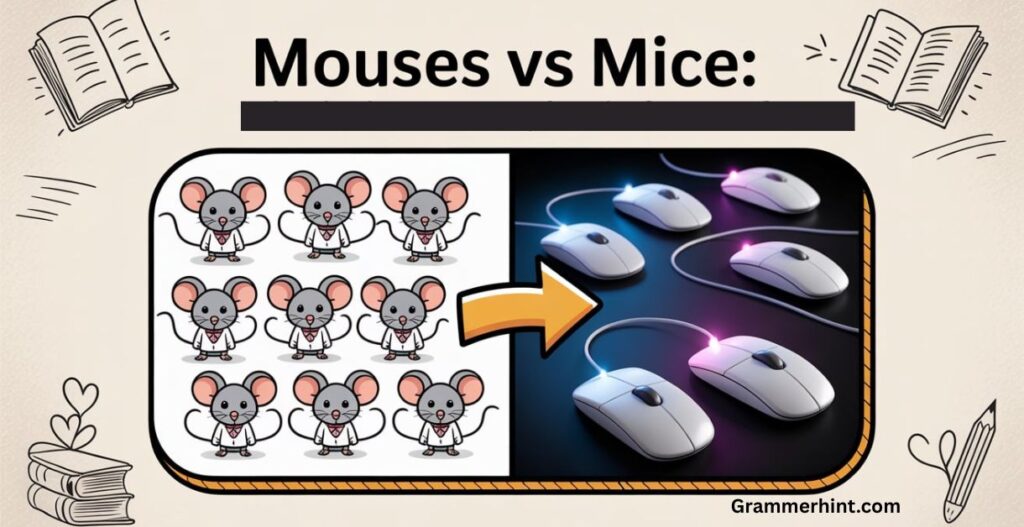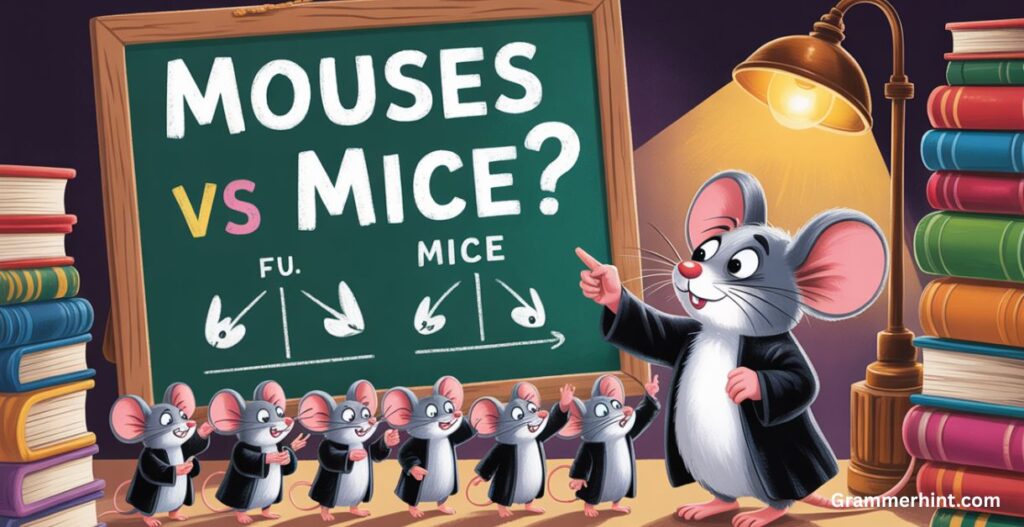If you’ve ever scratched your head wondering whether the plural of mouse is mouses or mice, you’re not alone. English grammar can be puzzling especially when technology throws in a curveball. Let’s break it all down in plain, conversational English.
What Does “Mouse” Mean Anyway?
Before jumping into plural forms, let’s first define what a mouse actually is. The word “mouse” can refer to:
- A small rodent, common in homes, fields, and scientific research labs.
- A computer device used for pointing, clicking, and scrolling.
This dual identity lies at the heart of the confusion.
Plural of Mouse: Mice or Mouses?

The correct plural usage of “mouse” depends entirely on context.
- If you’re talking about animals, the plural is mice.
- If you’re referring to computer devices, both mice and mouses are used, though mice is more common.
So, is “mouses” correct plural?
Technically, yes in computing. But in most style guides and dictionaries, “mice” is preferred, even for the tech gadget.
Let’s take a look at both forms.
Mice: The Traditional Plural
The plural “mice” is what we use for animals:
“Last night, we spotted three mice running under the sink.”
But “mice” is also used in many professional and tech contexts:
“We need to order ten wireless mice for the office.”
This dual use shows just how slippery English grammar rules can be.
Mouses: A Modern Twist
Mouses as a plural appears mostly in computing circles. It’s used to differentiate between animal vs device grammar.
For example:
“We’ve got three damaged mouses replace them ASAP.” From an IT support ticket
This usage emerged as computers became mainstream, leading to technological terminology adaptation.
Mouses definition (informal): More than one computer mouse, especially used in IT contexts to avoid confusion with rodents.
Mouse Plural Form: Why So Confusing?
This confusion exists because mouse pluralization rules don’t follow a single path:
- Mice comes from Old English noun patterns.
- Mouses arises from the need to distinguish computer terminology.
Here’s where etymology of ‘mouse’ plays a role.
Word Origin of Mouse
The word mouse comes from the Old English “mūs”, which itself stems from Proto-Germanic “mūs” and Proto-Indo-European “mūs”, both meaning the same rodent we know today.
In ancient English, many nouns changed their internal vowels to become plural this is called ablaut, seen in:
| Singular | Plural |
|---|---|
| Mouse | Mice |
| Louse | Lice |
| Goose | Geese |
| Man | Men |
| Foot | Feet |
This is why “mice” feels natural for animals but weird when talking about your desk gadgets.
Computer Mouse vs Animal Mouse

Here’s where the animal vs object semantics really starts to matter.
- A mouse (animal) is a living creature.
- A mouse (device) is an object originally named for its tail-like cord, giving rise to the nickname.
So, the mice and mouse difference goes beyond grammar it’s about meaning.
Why Is It Called a Mouse (in Tech)?
Thank Douglas Engelbart, the inventor of the first computer mouse. He coined the term because the device had a tail-like cable.
Engelbart computer invention changed how humans interact with machines. That small “mouse” revolutionized computing.
Mice in Computers: Modern Usage
Even tech companies use both forms:
- Apple uses “mice” on their website.
- Tech repair forums often refer to “mouses” when discussing multiple devices.
This shows how computer accessories grammar isn’t set in stone—it’s fluid.
Mouse Grammar Examples in Sentences
To clear it up, here are some helpful real-life examples.
Animal Context:
“The lab was filled with test mice for the experiment.” — Scientific Journal
“Please ensure the mice cages are cleaned daily.” — Email from Lab Supervisor to Assistant
Technology Context:
“The shipment contains 100 wireless mice and 50 keyboards.” — Purchase Order
“We’ve had problems with several mouses not syncing properly.” — IT Support Email to John
These show the difference between mice and mouse across different industries.
When to Use Mice or Mouses
Here’s a cheat sheet:
| Context | Recommended Plural |
| Animal | Mice |
| Technology (Formal) | Mice |
| Technology (Informal) | Mouses |
So, if you’re wondering “when to use mice or mouses,” consider your audience.
English Grammar Rules for Plurals
Let’s get nerdy. Most English plurals follow this rule:
Add -s or -es to the singular noun.
Standard plural rules apply to words like:
- Car → Cars
- Dish → Dishes
- House → Houses
- Spouse → Spouses
But mouse plural form is irregular—just like:
- Louse → Lice
- Child → Children
- Ox → Oxen
These are known as irregular plurals English.
Funny Plurals in English
English has some oddly entertaining plural forms. Consider:
- One cactus, two cacti
- One fungus, many fungi
- One tooth, several teeth
It’s part of what makes language learning fun and frustrating!
The pluralization of tech terms like mouse just adds another layer.
Mouse and Mice Difference Recap
Let’s summarize the mouse and mice difference:
| Type | Singular | Plural (Preferred) | Alternate Plural |
| Animal | Mouse | Mice | ❌ |
| Tech Device | Mouse | Mice | Mouses |
If you’re explaining to someone the mice vs mouses grammar issue, this table helps.
Mouse in Scientific Research and Tech
In labs, mice in scientific research are crucial. The word “mice” is standard in this domain:
“The mice were injected with a new compound.”
Meanwhile, in computing:
“These Bluetooth mouses are failing to connect properly.”
Welcome to the bizarre world of English etymology examples.
Differences Between Rat and Mouse
Bonus tip: The difference between mouse and rat matters too.
| Mouse | Rat |
| Smaller, lighter | Larger, heavier |
| Pointed snout | Blunt snout |
| Longer tail (proportional) | Thicker tail |
This is handy for ESL learners studying grammar tips for beginners.
Trackpads vs Mouses: The Battle of Input Devices
Which is better—trackpads vs mouses?
- Trackpads are built-in, good for travel.
- Mouses offer better precision, especially for gamers and designers.
Again, note the plural “mouses” is acceptable in computing.
Computer Basics & Peripherals
In the realm of computer basics, the mouse pointer, keyboard, and monitor are the holy trinity.
These computer peripherals are foundational to any workstation.
And yes, when ordering a dozen devices, it’s OK to say:
“Twelve wireless mice are ready for deployment.”
Language Evolution and Modern Grammar
English evolves. Always has. Always will.
The case of mice vs mouses is a classic example of language evolution in action.
Just like:
- “Inbox” became a verb.
- “Google” became a synonym for searching.
So don’t be surprised if “mouses” one day lands in the dictionary with no raised eyebrows.
Final Word: What’s the Correct Plural of Mouse?
So, what’s the deal with mouse ka plural?
- Mice = Standard for both animals and often for devices.
- Mouses = Informally accepted in tech fields.
Your safest bet? Stick with mice, especially in professional settings. But don’t be afraid to use mouses in IT discussions where clarity matters.









